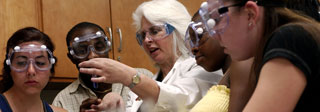| Requirements
of the Major Requirements of the Minor | Convener: Stephen Anderson Faculty: Anita J. Brandolini Arthur M. Felix |
Carol Frishberg Robert Mentore Robert J. Shine |
About the Major
The study of chemistry provides an understanding
of matter and its transformation and reactions. It is central
to the understanding of biological and environmental problems.
Far from being an esoteric discipline, chemistry has a profound
influence on everyday lives. Chemicals are added to food and
water for health, preservation, and taste. Synthetic polymers
are being used to replace natural materials in furniture and
clothing. The major mode of transportation, the automobile,
uses the energy released by chemical reactions to start and
move. The human body manufactures hormones and enzymes that
regulate the living process. Medicine cabinets are stocked with
drugs whose chemistry affects the state of body and mind.
The chemistry major at Ramapo, offered by the School of Theoretical
and Applied Science, gives its students an in-depth grasp of
theoretical concepts as well as a variety of practical skills.
In the first year, students take Fundamentals of Chemistry,
an introduction to modern chemical theory presented through
the study of atomic and molecular structure. In the next three
years, courses in organic, analytical/instrumental, and physical
chemistry increase understanding. A selection of chemistry electives,
including Cooperative Education placements, independent research
study, and a broad range of special topic electives, allow senior
students to concentrate in any one of six areas: theoretical,
organic, biochemistry, analytical/ environmental chemistry,
surface and colloid chemistry, or polymer science. Many interdisciplinary
courses are offered by other major programs in TAS. Students
are encouraged to plan a program of study that includes courses
from a number of sciences. Many of the scientific advances of
this modern age are in interdisciplinary areas such as biophysics,
materials science, molecular biology, and environmental science.
Ramapo and Rutgers University also offer a joint B.S./Graduate
Degree program in chemistry that may make it possible for an ambitious
student to complete requirements for a B.S./M.S. in five years
or a B.S./ Ph.D. in seven years.
Ramapo’s safety-conscious laboratories
rely upon contemporary instrumentation, including infrared, ultraviolet-visible,
fluorescence, and nuclear magnetic resonance spectrometers,
liquid and gas chromatographs, GC/MS, and atomic absorption
instruments. Laboratory courses offer a hands-on approach and
provide students with valuable experience in technical and analytical
skills.
The program is approved by the American Chemical Society. All
Ramapo students graduating with a major in chemistry can be
certified by the ACS if they have taken certain specified courses.
Job opportunities available to chemistry majors encompass a
wide range of activities and institutions. Private industry
offers the largest number of positions for chemists, with additional
opportunities in federal, state and local government laboratories,
research institutes, hospitals, and analytical laboratories.
The variety of jobs includes laboratory work, sales, technical
service, and administration in the areas of product development,
research and production. A bachelor’s degree in chemistry
is also a valuable background for students wishing to pursue
graduate work in medicine, dentistry, or veterinary work as
well as in chemistry, biochemistry, or molecular biology.
The chemistry faculty is actively engaged in scientific research.
Among their interests are such widely diverse areas as structure
and dynamics of ultrathin organic and biopolymer films, biomaterials
science, spectroscopy of biological macromolecules, quantum chemistry,
peptide/protein science, medical chemistry, organometallic synthesis, catalysis, green chemistry and computer simulations of experiments. Students are encouraged to participate
in faculty supervised research projects. Chemistry majors may
also work in Ramapo’s Cooperative Education program, where
industrial work experience, for which students earn money and
credit simultaneously, alternates with full-time or part-time
study.
Ramapo students graduating with a major in chemistry will:
-
have a general knowledge of the basic area of biochemistry and have the ability to apply it in a problem-solving environment; be proficient in basic chemical, biochemical, and physical laboratory skills
-
have had the opportunity of conducted a research project as part of an upper level course or as a participant in active, individual laboratory research within the college or appropriate cooperative education assignment
-
have the ability to communicate scientific information clearly and precisely, both orally and in writing
-
have an understanding of the principles and applications of modern instrumentation, computation, experimental design, and data analysis
-
have the ability to formulate and carry out strategies for solving scientific problems
Ramapo has state-of-the-art laboratories for chemistry, biochemistry, genetics, molecular biology, and physics that are utilized in the major. There are opportunities for students to do research with faculty and for experiential learning through cooperative education in nearby industry. The program is supported by computer labs that are available for student use to supplement the instruction in the lecture and laboratories. The major in chemistry is offered by the School of Theoretical and Applied Science and leads to a B.S. degree.
| Ramapo College of New Jersey recognizes the value of publishing on the Internet and encourages the campus community to produce personal World Wide Web pages to enhance communications. The College does not preview, review, censor, or control the content of these pages in any way as a matter of course. Personal Web pages are those of the authors, and do not in any way constitute official Ramapo College of New Jersey content. |
[ return to top ]



